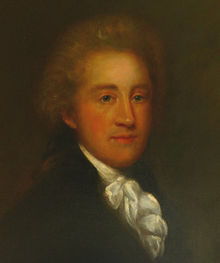Archibald Cochrane, 9th Earl of Dundonald
Archibald Cochrane, 9th Earl of Dundonald (born January 1, 1749 in Culross (Scotland) , † July 1, 1831 in Paris ) was a Scottish - British peer , chemist and entrepreneur. He is referred to as the father of the British coal tar industry, but he also promoted other areas of the chemical industry in Great Britain.
Life
He was the eldest surviving son of Thomas Cochrane, 8th Earl of Dundonald (1691–1778), and his second wife Jean Stuart and had four younger brothers. Archibald Cochrane went to sea at the age of 14 as a midshipman and later acting lieutenant under Captain Stair Douglas off the coast of Guinea . In 1764 he moved to the British Army as cornet of the King's Own Regiment of Dragoons , where he stayed until 1768. He then acquired a captaincy in the British East India Company's 104th Regiment of Foot . In 1778 he took over the inheritance after the death of his father, which was financially insignificant, and was 9th Earl of Dundonald .
As a seaman he had seen how quickly the wooden ships of the Navy could rot, sometimes in a few months at sea, and after returning he experimented with coal tar for sealing in Nore (at the sandbank in the Thames estuary, where the ships of the Royal Navy often anchored ). In 1780 he found an economical way of making coal tar from bituminous coal and borrowed £ 10,000 from his wife to set up the British Tar Company with partners. One of the partners was John Clerk, who had similar ideas and received a patent in 1781. The factory was to be located in Culross Abbey and the advisor was the famous Scottish chemist Joseph Black . The tar sold well as a protective coating for ships, the turpentine for house painting and the coke in ironworks. He exported to Norway and Russia and had a business relationship with Matthew Boulton . He had further business relationships with John Loudon McAdam , who worked for him in the supervision of a factory and who later invented the macadam . The Royal Navy only switched to tar paints after the company's patent expired and initially stayed with copper plates as protection for the ship's hulls.
In 1784 he became a Fellow of the Royal Society of Edinburgh .
In the middle of the 1780s he also expanded into salt production and sought a temporary monopoly for coal tar extraction and many applications in the chemical industry by submitting a petition to parliament, which, however, representatives of the coal industry opposed. In the 1790s, he also got into soda production using his coal products. He founded further factories for the production of various salts (potassium chloride, potassium sulfate, sodium phosphate, ammonium salt, saltpeter, alum for dye works), especially for the fertilizer industry, and alcohol distilleries.
In 1791 he suggested making bread from potatoes and using potato flour, for example, as provisions on ships, cattle feed and for the production of potash (the model was tapioca from the Indians of the Caribbean).
family
From his first marriage to Anne Gilchrist († 1787) in 1774, he had six sons and one daughter:
- Thomas Cochrane, 10th Earl of Dundonald (1775-1860), Admiral in the Royal Navy;
- Hon. James Gilchrist Cochrane († young);
- Hon. Basil Cochrane († 1816), Lieutenant-Colonel in the British Army;
- Hon. William Erskine Cochrane (after 1776–1871), major in the British Army;
- Hon. Archibald Cochrane (1783–1829), Captain of the Royal Navy;
- Hon. Charles Cochrane († young);
- Lady Anne Cochrane (* 1777).
His second marriage, concluded in 1788 with Isabella Raymond († 1808), widow of John Mayne, remained childless. In 1819 he married Anna Maria Plowden († 1822), with whom he had a daughter:
- Lady Charlotte Georgina Dorothea Cochrane (1820-1830).
His brothers John Cochrane (1750–1801) and Basil Cochrane (1753–1826) were also successful as suppliers for the army and navy, and Basil in particular made great fortune through doing business in India. His brother Alexander Cochrane (1758-1832) became an admiral, his brother Andrew Cochrane-Johnstone (1767-1833) was an adventurer and politician who, like other members of the family, was embroiled in the 1814 stock scandal.
Fonts
- Manufacture and Trade of Salt on the Herring Fisheries and on the Coal Trade of Great Britain. 1784
- An Account of the Qualities and Uses of Coal Tar. 1785
- The Present State of Manufacture of Salt Explained. 1785
- A Treatise showing the intimate connection that subsists between agriculture and chemistry. 1795
literature
- Winfried R. Pötsch (lead), Annelore Fischer, Wolfgang Müller: Lexicon of important chemists . Harri Deutsch, Frankfurt am Main / Thun 1989, ISBN 3-8171-1055-3 , p. 128.
- Cochrane, Archibald, ninth Earl of Dundonald. In: HCG Matthew (Ed.): Dictionary of National Biography . Oxford University Press, Oxford 1995 ( online at thepeerage.com ).
Web links
- Paul Luter: Archibald Cochrane, 9th Earl of Dundonald. Father of the British Tar Industry. at oldcopper.org, 2005.
- Archibald Cochrane, 9th Earl of Dundonald on thepeerage.com
- Dundonald, Earl of (S, 1669) at Cracroft's Peerage
| predecessor | Office | successor |
|---|---|---|
| Thomas Cochrane |
Earl of Dundonald 1778-1831 |
Thomas Cochrane |
| personal data | |
|---|---|
| SURNAME | Cochrane, Archibald, 9th Earl of Dundonald |
| BRIEF DESCRIPTION | Scottish peer, chemist and entrepreneur |
| DATE OF BIRTH | January 1, 1749 |
| PLACE OF BIRTH | Culross (Scotland) |
| DATE OF DEATH | July 1, 1831 |
| Place of death | Paris |
